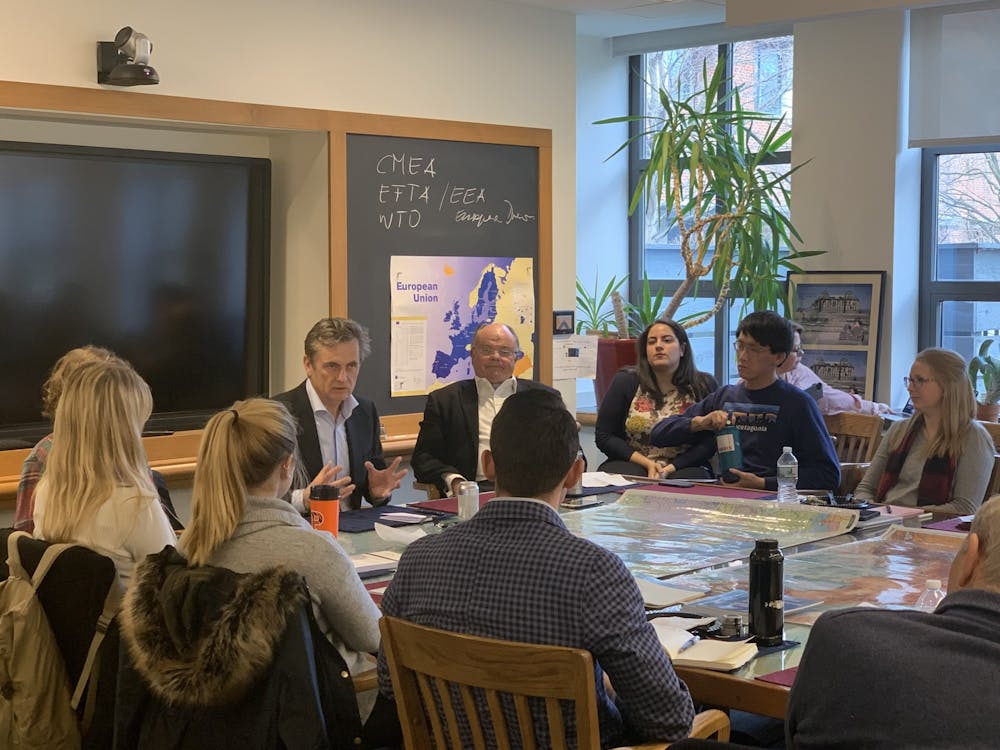Ambassador Christian Wenaweser, the most senior national ambassador at the United Nations, spoke to University students about the current state of multilateralism on Thursday.
The seminar was titled “75 Years of United Nations: The Importance of Rule of Law For Multilateralism.” Wenweser — Liechtenstein’s Permanent Representative to the United Nations — discussed nuclear proliferation, climate change, and a United States he views as indifferent to international institutions.
Wolfgang Danspeckgruber, professor at the Wilson School and founder of the Liechtenstein Institute on Self-Determination (LISD), introduced Wenaweser as an “institution within an institution who has been … tagged as one of the stalwarts and promoters of transparency and justice.”
Among Wenaweser’s most significant accomplishments, according to Danspeckgruber, was his role in the Rome negotiations, which formed the International Criminal Court.
Wenaweser discussed the United Nations’ role broadly, as well as its impact on specific issues, such as war and aggression, nuclear proliferation, climate change, and cyber warfare.
“This is a special moment in a way in the history of the U.N.,” Wenaweser observed, noting the upcoming 75th anniversary of the United Nations’ founding. He cautioned, however, that the present was not a time for self-congratulation, but rather for reflecting on the state of the institution, which he believes to be cause for some concern.
“I think the U.N. is [in] a very precarious moment right now,” he said.
In the past, the United Nations had little trouble convincing countries to agree to international solutions, Wenaweser noted, but this kind of multilateral cooperation has become increasingly difficult in recent years.

“We are now at a very different moment,” he said, “when more and more states … question multinational approaches.”
While respecting the importance of national sovereignty, being that he represents the sixth-smallest country in the world, Wenaweser argued that it would be a mistake to always insist on it, especially when a country faces a public health crisis, such as novel coronavirus.
“More and more governments favor national solutions, favor populist rhetoric, favor anti-globalist talk,” he said. “And of course some of those governments are very powerful, and of course the U.S. is one of them.”
Wenaweser laid out two possible responses to this issue. One is to repudiate the United Nations as a whole and find regional, smaller-scale alternatives to it. The other is to fully buy into the United Nations, because its contributions are needed now more than ever.

“We are sort of the latter school of thought,” he said, referring to Liechtenstein, which puts a high percentage of its GDP towards the United Nations. For a small state such as Liechtenstein, Wenaweser said, the investment is a necessity.
“The U.N. is the epitome of what international law means, and for us as a small state, it’s a very natural place to go. International law is what protects us. We have no other way of protecting ourselves against more powerful states,” he said. “So we want to have rules that are clear … that are agreed on the basis of negotiation … rules that we have had a role in shaping … and rules that are applicable to everybody.”
Wenaweser then pivoted to discuss nuclear disarmament, noting that the United Nations has become an important place for negotiation in this area. He praised the Joint Comprehensive Plan of Action agreement, also known as the Iran Nuclear Deal, and expressed concern about the Trump administration’s attempt to dismantle it, a move he said could have severe global consequences.
He characterized the overall attitude of the United States toward the United Nations as one of indifference, directly contradicting its historic prominence in the institution.
As an example of this attitude, Wenaweser brought up the Jan. 3 assassination of General Qasem Soleimani of Iran, an act that he thought violated the United Nations charter. The Trump administration’s justification of the assassination as an act of self-defense, he said, serves only to weaken the United Nations’ mandate.
“The regime that is reflected in the charter of the U.N. is really eroded, and international law is invoked and applied in a manner that in our view is … not a reflection of what we agreed to,” he said.
Despite the challenges the United Nations now faces, Wenaweser said, it is worthwhile to fight for an institution that can influence international policy on immense and complex issues.
“Sometimes people ask me, is this not a very depressing time to be a diplomat at the U.N.? And I think it’s absolutely [not] the case,” he said. “I think it’s a very challenging time. But I think it’s also a time to be there and to try to help steer things in a certain direction.”
This event was the first of the new series, “25 Years [of the] Prince of Liechtenstein Initiative on Self-Determination” at Princeton University. The series is co-sponsored by the Woodrow Wilson School, the Program on Law and Public Affairs, and the Institute for International and Regional Studies.








